高中英语 知识点大全76 joinjoin intake part inattend
- 格式:doc
- 大小:50.00 KB
- 文档页数:3
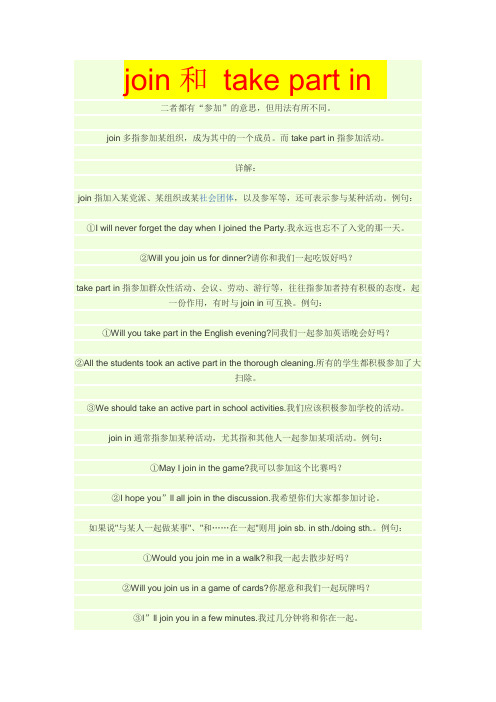
join和take part in二者都有“参加”的意思,但用法有所不同。
join多指参加某组织,成为其中的一个成员。
而take part in指参加活动。
详解:join指加入某党派、某组织或某社会团体,以及参军等,还可表示参与某种活动。
例句:①I will never forget the day when I joined the Party.我永远也忘不了入党的那一天。
②Will you join us for dinner?请你和我们一起吃饭好吗?take part in指参加群众性活动、会议、劳动、游行等,往往指参加者持有积极的态度,起一份作用,有时与join in可互换。
例句:①Will you take part in the English evening?同我们一起参加英语晚会好吗?②All the students took an active part in the thorough cleaning.所有的学生都积极参加了大扫除。
③We should take an active part in school activities.我们应该积极参加学校的活动。
join in通常指参加某种活动,尤其指和其他人一起参加某项活动。
例句:①May I join in the game?我可以参加这个比赛吗?②I hope you”ll all join in the discussion.我希望你们大家都参加讨论。
如果说"与某人一起做某事"、"和……在一起"则用join sb. in sth./doing sth.。
例句:①Would you join me in a walk?和我一起去散步好吗?②Will you join us in a game of cards?你愿意和我们一起玩牌吗?③I”ll join you in a few minutes.我过几分钟将和你在一起。
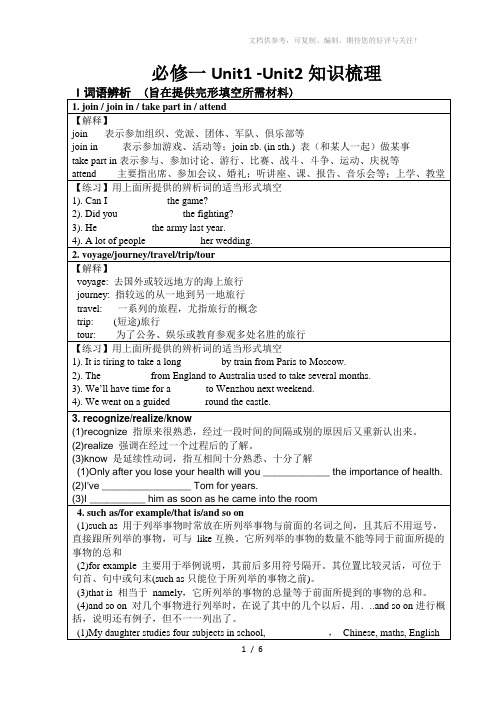
必修一Unit1 -Unit2知识梳理Ⅲ语言点Unit1重点词汇1.upset adj. 心烦意乱的,不安的;不适的vt. (upset, upset ) 现在分词_________ [重点用法]be upset about / over为某事烦恼[练习] 用upset的适当形式填空1). She felt rather ______ about her illness.2). This problem really ______ her.3). Don’t be ______. It will be OK.2. concern v.担忧; 涉及; 关系到n. 担心,关注;(利害)关系[典例]1). The news concerns your brother. 这消息与你兄弟有关。
2). The boy's poor health concerned his parents. 那男孩健康状况不佳,使他的父母亲忧虑。
[重点用法]as / so far a s … be concerned 关于;至于;就……而言be concerned about 关心be concerned with 与…相关[练习] 介词填空1). The children are rather concerned _______ their mother’s health.2). This book is concerned ______ Chinese history.3.settle安家, 定居;解决; 决定; 调停; 支付, 结算【原句回放】She found it difficult to settle and calm down in the hiding place.EX: 写出划线部分内容的中文意思A. After years of travel, we decided to settle here. ______B.It's time you settled your dispute with him. ______C.The account is not yet settled. ______词组settle the problem= solve the problem4. suffer vt.& vi.遭受;忍受;经历1). Do you _________ headaches? 你常头痛吗?). We_______________ in the financial crisis. 我们在金融危机中损失惨重。
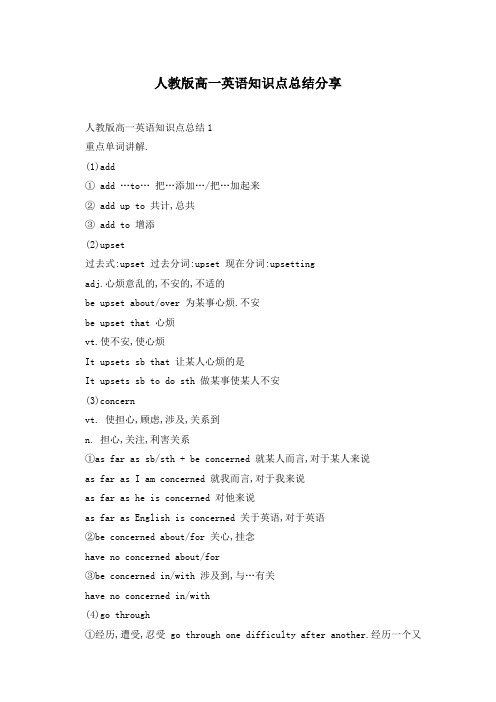
人教版高一英语知识点总结分享人教版高一英语知识点总结1重点单词讲解.(1)add① add …to… 把…添加…/把…加起来② add up to 共计,总共③ add to 增添(2)upset过去式:upset 过去分词:upset 现在分词:upsettingadj.心烦意乱的,不安的,不适的be upset about/over 为某事心烦.不安be upset that 心烦vt.使不安,使心烦It upsets sb that 让某人心烦的是It upsets sb to do sth 做某事使某人不安(3)concernvt. 使担心,顾虑,涉及,关系到n. 担心,关注,利害关系①as far as sb/sth + be concerned 就某人而言,对于某人来说as far as I am concerned 就我而言,对于我来说as far as he is concerned 对他来说as far as English is concerned 关于英语,对于英语②be concerned about/for 关心,挂念have no concerned about/for③be concerned in/with 涉及到,与…有关have no concerned in/with(4)go through①经历,遭受,忍受 go through one difficulty after another.经历一个又一个困难.②仔细检查,审查 go through your paper 检查你的试卷.③浏览,翻阅 go through all the related reference.浏览相关资料.④通过,穿过=pass through go through a great forest.穿过一片大森林.⑤完成 go through the task.完成任务.(5)suffer①suffer 作〝遭受〞时,后面直接接pain, loss, injury, harm或punishment.②suffer 作〝受…苦〞时,常常搭配:suffer from(6)get/be tired of 厌烦…get/be/feel tired of sb / sth / doing sth 厌烦be tired from 由于…而疲劳(体力上的疲劳),侧重原因be tired out 精疲力竭的(7)join in 参加,加入区别join ,join in ,attend 与 take part in:join:多指加入组织,团体,党派等,有作为其中一员的意思.例:join the army 参军join in:参加某项游戏,活动,讨论等.常用结构:join sb in例:Will you join us in a walk?attend:参加会议,婚礼,葬礼,上课,讲座,听报告等.例:attend a lecture 参加一个讲座.take part in:多指参加群众性的活动,运动,战争等.例:take part in the march.人教版高一英语知识点总结2虚拟条件句条件状语从句是非真实情况,在这种情况下要用虚拟语气.l-条件从句与现在事实不一致,句型为:If+主语十过去时,tiag+should (could,would,或might)+动词原形,例如:If lwere you,1 would study hard.2.条件从句与过去事实不一致,句型为:If+主语+had+过去分词,主语+should(could,would,或might)+have+过去分词,例如:If I had not studied hard.1would have failed in thee_am last term3.条件从句与将来事实不一致,句型为:lf+主语+should/were to+do,主语+should( could.)+原形do,例如:If lwere to go to the moon one day,I could see itwith my own eyes.注意:1.If条件句中绝对不可出现〝would〞.2-根据句中的时间状语,有时可能出现〝混合虚拟〞的情况,即主句可能是现在的情况,条件句也许是发生在过去的情况,但都遵守上述句型.3.在条件句中如果出现were,had,should可省去if将这些词提前置于句首构成倒装,例如:w.re I to go tothe moon one clay,1 would see it with myown eyes.如果有一天我登上月球,我就可以亲眼目睹它的样子了.人教版高一英语知识点总结3直接引语和间接引语(一)直接引述别人的原话,叫做直接引语;用自己话转述别人的话,叫做间接引语.间接引语一般构成宾语从句.直接引语必须放在引号内,间接引语则不用引号.直接引语改为间接引语时,除将引语部分变成宾语从句外,还必须对直接引语中的人称.时态.指示代词.时间状语.地点状语等进行改变.1. 时态的变化:直接引语变为间接引语时,通常受转述动词said,asked等的影响而使用过去化的时态,即把原来的时态向过去推,也就是一般现在时变为一般过去时,现在进行时变为过去进行时,等等.例如:Tom said to me,〝My brother is doing his homework.〞→Tom said to me that his b rother was doing his homework.2. 人称代词.指示代词.时间状语.地点状语等等的变化: 根据意义进行相应的变化,例如:She asked Jack,〝Where have you been?〞→She asked Jack where he had been.He said,〝These books are mine.〞→He said that those books were his.(二)直接引语改为间接引语时,都使用陈述语序,但是因为原句的句式不同,所以变成间接引语时所用的连词会有所不同.直接引语如果是一般疑问句,用连接词whether或if;如果是特殊疑问句,则用疑问词引导间接引语.转述的动词一般用asked,可以在其后加上一个间接宾语me,him, her, us等.如:She said,〝Is your father at home?〞→She asked me if/whether my father was at home.〝What do you do every Sunday?〞My friend asked me.→My friend asked me what I did every Sunday.直接引语如果是祈使句,改为间接引语时,要将祈使句的动词原形变为带to的不定式,并在不定式的前面根据原句的语气(即请求或命令)加上ask, tell,order等动词,如果祈使句为否定式,则在不定式前加not.其句型为:ask / tell / order someone (not) to dosomething. 例如:She said to us,〝Please sit down.〞→She asked us to sit down.He said to him,〝Go away!〞→He orde red him to go away.He said, 〝Don’t make so much noise, boys.〞→He told the boys not to make so much noise.人教版高一英语知识点总结4raise vt.〝使……上升;升起;提高〞等;rise vi.〝上升;升起〞;arise vi.〝站起来(stand up)〞,〝起床(get up)〞rise和arise用作站起,起床都属正式用法;arise主要表示〝出现.发生〞等意思.She raised her voice in anger. (抬高)The wind raised the fallen leaves from the ground. (刮起)The child rose from the ground and ran to his mother. (=The child raisedhimself from the ground and ran to his mother.) (爬起)She rises before it is light. (起床)Difficulties will arise as we do the work. (出现)人教版高一英语知识点总结5重点短句1. be good to 对......友好 be good for 对......有益;be bad to…/be bad for…2. add up 加起来增加 add up to 合计,总计add… to把......加到......3. not…until/till 意思是〝直到…才〞4. get sth/sb done 使......完成/使某人被......5. calm down平静下来6. be concerned about 关心关注7. 当while, when, before, after 等引导的时间状语从句中的主语与主句的主语一致时,可将从句中的主语和be动词省去.While walking the dog, you were careless and it got loose. 8. cheat inthee_am 考试作弊9. go through 经历;度过;获准,通过 _. hide away 躲藏;隐藏 _. set down 写下,记下_. I wonder if….. 我不知道是不是…. _. on purpose 故意_. sth happen to sb 某人发生某事sb happen to do sth 某人碰巧做某事 it so happened that ......正巧碰巧_. It is the first (second…) that… (从句谓语动词用现在完成时) _. in one’s power处于......的控制之中 _. It’s no pleasure doing…. 做…..没有乐趣It’s no good/ use doing sth. 做某事是没好处/没用的_. She found it difficult to settle and calm down in the hiding place.it做形式宾语 _. suffer from 患…病;遭受_. so…that… /such…thay…_. get tired of…. 对…感到劳累疲惫_. have some trouble with sb/sth. 在......上遇到了麻烦 _. get along with sb/sth.与某人相处23. ask(sb)for advice. (向某人)征求建议24. make 后接复合宾语,宾语补足语须用不带to 的不定式.形容词.过去分词.名词等.常见的有以下几种形式:make sb. do sth.让 (使)某人做某事 make sb. /sth. +adj. 使某人/物… make sb./ oneself +v-ed 让某人/自己被…When you speak, you should make yourself understood. make sb.+n. 使某人成为…25. alone /lonely. 单独的/孤独的26. I wou ld be grateful if… 委婉客气提出请求27. Why not do….. = why don’t youdo…人教版高一英语知识点总结分享。

单元经典短语详解take part in 参加(活动)【经典例句】He took an active part in sports.他积极参加体育运动。
【考点聚焦】比较:take part in,join,join in,attendjoin参加,加入(组织、政党、团体等)如:join the Party入党join the army参军join(sb.)in (doing) sth.参加活动,一起做某事如:Will you join us in the discussion?你和我们一起讨论吗?The whole crowd joined in singing the popular song.一群人一起唱流行歌曲。
attend 出席,参加如:attend school 上学attend a meeting 参加会议【活学活用】14.用take part in,join,join in,attend的合适形式填空1)I hope you’ll the discussion.2)Will you us the English evening?3)I the school basketball team last term.4)He often a social gathering in the school.5)Every four years,many athletes from different countries the Olympic Games.答案:1)join in/take part in2)join;in3)joined4)attends5)join in/take part in depend on依靠、依赖【经典例句】All living things depend on the sun for their growth.万物生长靠太阳。
【考点聚焦】depend on除表示“依靠、依赖”外,还可译成“相信”“依……而定”。
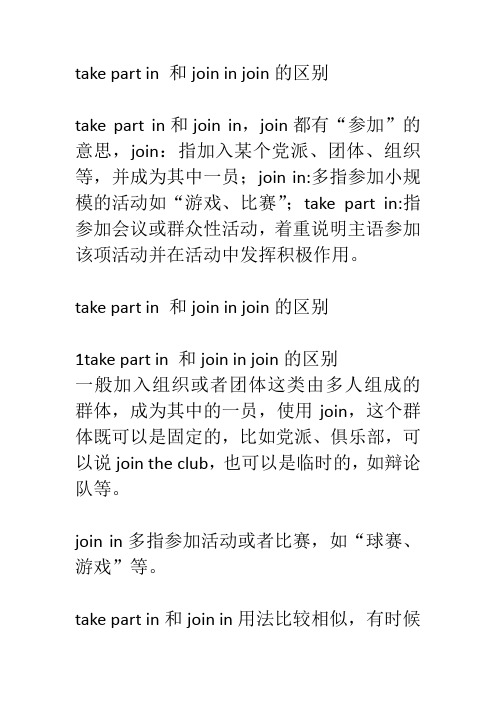
take part in 和join in join的区别
take part in和join in,join都有“参加”的意思,join:指加入某个党派、团体、组织等,并成为其中一员;join in:多指参加小规模的活动如“游戏、比赛”;take part in:指参加会议或群众性活动,着重说明主语参加该项活动并在活动中发挥积极作用。
take part in 和join in join的区别
1take part in 和join in join的区别
一般加入组织或者团体这类由多人组成的群体,成为其中的一员,使用join,这个群体既可以是固定的,比如党派、俱乐部,可以说join the club,也可以是临时的,如辩论队等。
join in多指参加活动或者比赛,如“球赛、游戏”等。
take part in和join in用法比较相似,有时候
也可以互换,可以指参加活动、比赛等团体性的活动,但是注意take part in不可以和join互换。
2take part in 和join in join的例句
Tom joined the Army last year.汤姆去年参军了。
Jack can join in this speech activity.杰克可以参军这次的演讲活动。
Tim took part in this acticity and helped each other positively.提米参加了这次活动而且积极帮助他人。
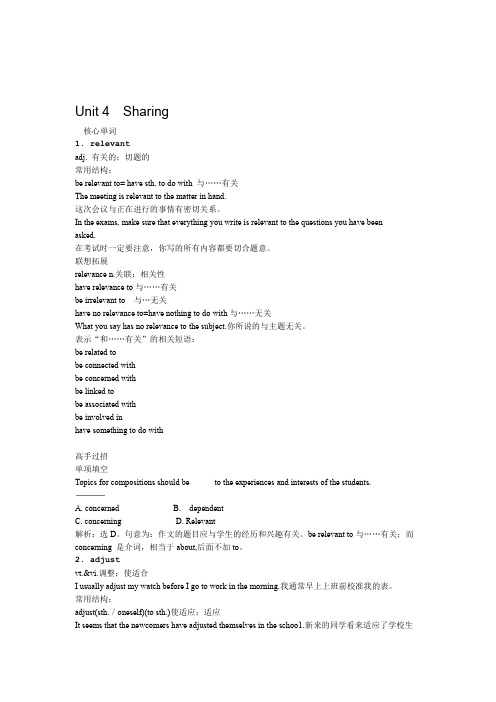
Unit 4 Sharing核心单词1. relevantadj. 有关的;切题的常用结构:be relevant to= have sth. to do with 与……有关The meeting is relevant to the matter in hand.这次会议与正在进行的事情有密切关系。
In the exams, make sure that everything you write is relevant to the questions you have been asked.在考试时一定要注意,你写的所有内容都要切合题意。
联想拓展relevance n.关联;相关性have relevance to与……有关be irrelevant to 与…无关have no relevance to=have nothing to do with与……无关What you say has no relevance to the subject.你所说的与主题无关。
表示“和……有关”的相关短语:be related tobe connected withbe concerned withbe linked tobe associated withbe involved inhave something to do with高手过招单项填空Topics for compositions should be to the experiences and interests of the students.A. concernedB. dependentC. concerningD. Relevant解析:选D。
句意为:作文的题目应与学生的经历和兴趣有关。
be relevant to与……有关;而concerning 是介词,相当于about,后面不加to。
2. adjustvt.&vi.调整;使适合I usually adjust my watch before I go to work in the morning.我通常早上上班前校准我的表。
高中必修一各单元英语知识点人的威历隐藏在学问之中,因此,人有很多君主的金银无法买到,君主的武力不行折服内在的东西。
下面我给大家共享一些中学必修一各单元英语学问,盼望能够协助大家,欢送阅读!中学必修一各单元英语学问1Unit One Friendship一、重点短语1.go through 经验,经受get through 通过;完成;接通电话2. set down 登记,放下3. a series of 一系列4. on purpose 有目的的5. in order to 为了6. at dusk 黄昏,黄昏时刻7. face to face 面对面8. fall in love 爱上9. join in 参与(某个活动);take part in 参与(活动)join 参加(组织,团队,并成为其中一员)10. calm down 冷静下来11. suffer from 遭遇12. be/get tired of…对…感到厌倦13. be concerned about 关怀14. get on/along well with 与…相处融洽15. be good at/do well in 擅长于…16. find it + adj. to do sth. 发觉做某事是…17. no longer / not …any longer 不再…18. too much 太多(后接不行数n.)much too 太…(后接adj.)19. not…until 直到… 才20. it’s no pleasure doing sth 做… 并不快乐21. make sb. sth. 使某人成为…make sb. do sth. 使某人做某事二、语法----干脆引语和间接引语概念:干脆引语:干脆引述别人的原话。
一般前后要加引号。
间接引语:用自己的话转述别人的话。
间接引语在多数状况下可构成宾语从句且不要加引号。
必修五U1 Great Scientist 重点词汇、短语&句型形象记忆[动]construct建造↔[动]destroy破坏[名]construction建造↔[名]destruction破坏形象记忆Many people contributed money to the poor boy, which contributed to his returning to school. A writer wrote a story about this and contributed it to a newspaper.许多人给那个可怜的男孩捐款,使他可以重返校园。
一位作家写了一则关于此事的故事并把它投到一家报社。
形象记忆5. He placed a fixed sun at the centre of the solar system with_the_planets_going_round_it and only the moon still going round the earth.他把固定的太阳放在太阳系的中心,别的行星都围绕太阳转动,只有月亮仍然围绕地球转动。
with the planets going round it 是“with +宾语+宾语补足语”结构,在句中作状语,表示原因、条件、伴随等。
此外,此结构还可作后置定语。
with 复合结构的构成:with +宾语+⎩⎪⎨⎪⎧ adj ./adv ./介词短语宾语和宾补之间是主动关系宾语和宾补之间是被动关系不定式作宾补有“将来”的含义①The little boy ran along the street with nothing on. 这个小男孩沿街跑着,什么也没穿。
②With prices going_up,_we can't afford too many clothes. 随着物价的上涨,我们买不起太多的衣服。
J---一417join, join in, take part in, attend, enter for, sit for和go in for1join用作及物动词,表示“参加,加入”,后面可以跟团体等作宾语,也可以跟人作宾语,搭配有:join the army 参军join the Party 入党join the League 入团join the team 入队join the club参加俱乐部join sb.和某人一起(干)join sb. in sth./in doing sth.和某人一起进行某项活动2join in通常指参加正在进行着的活动,如work, talk, game, match等;join in也可单独使用,结构为:join in+某项活动join in doing sth.Please come and join in the game.请来参加游戏。
Would you please join in playing football?你来参加踢足球好吗?One bird began to sing and other birds also joinedin.一只鸟开始鸣叫,别的鸟也叫了起来。
比较Will you join in the talk?你参加谈话吗?Will you join us in the talk?你参加我们的谈话吗?He joined in the match.他参加了那场比赛。
He joined us in the match.他参加了我们的比赛。
提示①join sth.to sth.表示“把某物同某物连接起来”。
He joined this line to that one.他把这条线同那条线连接起来。
2表示“连续,连合,相连”时,join可用作及物动词和不及物动词。
A new road joins the mountain village to thetown.一条新路把这个山村同小城连接起来了。
高中英语知识点大全(76):join/join in/take part in/attend 1、接不定式和动名词意义不同的词
1)remember doing/having done记得曾做过某事remember to do记住去做某事。
对比:
Do you remember meeting me at a party last year?
Please remember to write to your parents when you get there.
2) regret doing/having done 后悔做了(或没做)某事/regret to do遗憾地去做某事。
对比:
I regret telling her the truth.
I regret to say that you are completely wrong.
3)try to do 尽力去做/try doing 试着去做
对比:She tried to learn it by heart.
She tried adding more salt to the soup.
4) forget doing 忘记曾经做过/forget to do 忘记去做
对比:I forget reading about it in a magazine.
Don’t forget to shut off the gas when you finish cooking.
5) stop doing 停止做/stop to do 停止某一动作去作另一动作(说明停止的目的)
对比:They didn’t start until it stopped raining .
We stopped to see what was going on.
6) mean doing 意味着/mean to do 打算,意图做
对比:Missing the train means waiting for an hour.
I meant to come, but a friend of mine went to see me .
7) want doing 需要(物作主语,动名词主动表示被动)/want to do 想做(人作主语)
对比:The wall wants painting. I want to paint the wall myself.
2、join/join in/take part in/attend
1) join 表示“加入党派,组织、社团、俱乐部”等。
如:join the Party/Youth League/army/club/organization入党/入团/参军/加入俱乐部/加入组织。
Would yo join us(in) singing? 和我们一起唱歌吧!
His brother joined the army a year ago. 他哥哥一年前参军了。
Join还可表示“来(去)和某人呆在一起,把……连在一起”
I will join you in a few minutes. 我一会就过来。
Please join the two ends of the rope together. 把绳子两头接起来。
2) join in 表示“参加正在进行的活动”。
如:join in a game
/discussion/conversation/walk/talk参加游戏/讨论/谈话/一起散步/一起讨论。
亦可说:join sb. in (doing)sth.表示“加入某人一起做某事”。
3) take part in 表示“参加会议、活动”,侧重说明主语参加并发挥一定作用,part 前若有修饰语,要用不定冠词。
如:take (an active)part in a party/school
activities/physical labour(积极)参加聚会/学校活动/体力劳动。
4) attend 表示“出席、参加会议、仪式、婚礼、葬礼、典礼、上课、上学、听报告”。
如:attend a meeting/a sports meeting/a concer/a show/school/a lecture参加会议/运动会/出席音乐会/出席展览会/上学/听演讲。
[应用]完成句子
①我哥哥参军2年了。
It’s two years since my brother_______the army.
②我的朋友和我一起祝你生日快乐。
All my friends_______ ________ ________ wishing you a happy birthday.
③今晚有一个聚会,你参加吗?
There will be a party this evening. Are you going to_______ ______ _______ it?
④迈克没有参加莉莉的婚礼。
Mike didn’t ______ Lily’s wedding.
Key:①joined ②join,me,in③take,part,in ④attend
3、keep doing sth. 连续、持续地做某事
①They kept sitting there for several hours. 他们在那里连续坐了好几个小时。
②He kept asking silly questions. 他不住地问些愚蠢的问题。